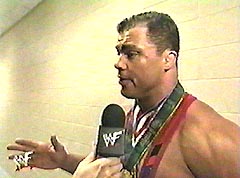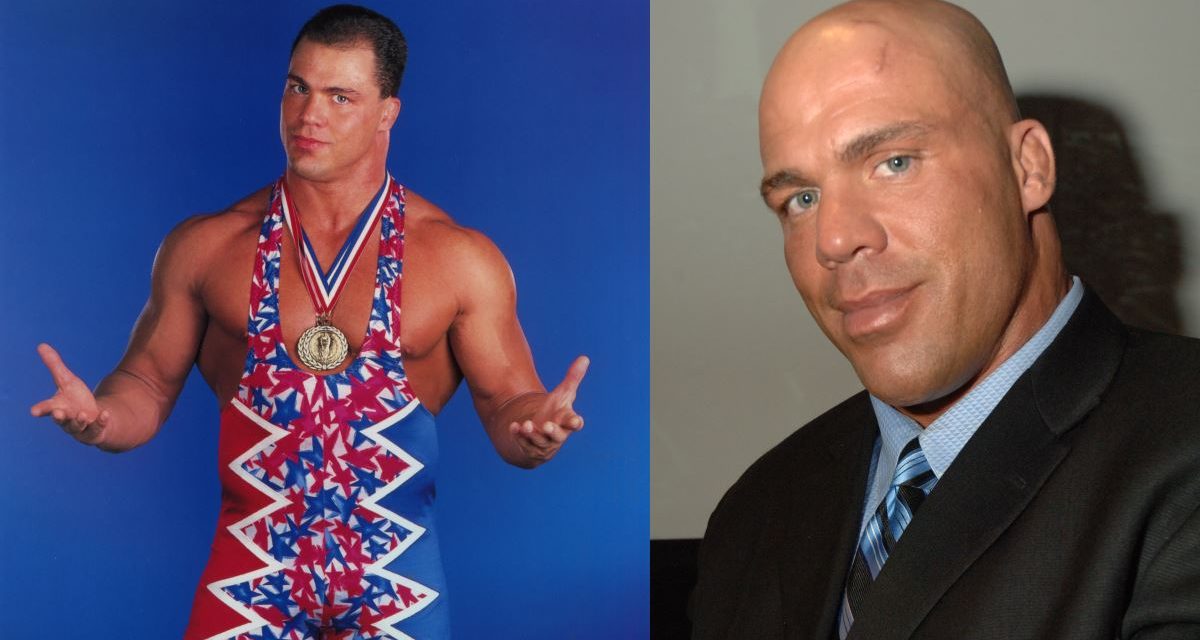 Kurt Angle is interviewed. |
Kurt Angle may be only a beginner in the WWF rings, but looking back at his gold medal win in the 1996 Olympic Games in Atlanta, it seems that he is more than a little familiar with the drama and spectacle of pro wrestling.
The Pittsburgh native had won a world championship in 1995, and was a favourite for the gold. But on the way to the final, many things happened.
In January, his coach and patron saint Dave Schultz, the 1984 Olympic champion, was murdered in a high-profile case on the estate of John E. du Pont.
After getting to the Atlanta Games, he pulled a leg muscle.
But through it all, Angle persevered, and found himself in the 220-pound class finals against a storybook villain, Iran’s Abbas Jadidi, an imposing strongman with a mustache suited for a silent-movie villain.
The two grapplers battled back and forth, and the duel went to an exhausting eight-minute overtime. A tense 90-second officials’ deliberation took place after the overtime period. The referee stood between both wrestlers, but raised Angle’s arm for the win. Jadidi, so spent in overtime his coach ran onto the mat and pleaded with him to continue, was furious. He yelled at the officials and briefly refused to accept his the silver medal.
As for the new American hero, Kurt Angle, he cried — on the medal stand, while giving his medal to mom, in the news conference. He ran around the arena with an American flag, leading the crowd in chanting “USA, USA!”
“This is the biggest thing that ever happened to me,” said Angle at the time. “I just let it go. I was just thinking about how hard I trained and how much stress I went through to do this. ”
But fame, as they say, is fleeting.
Angle did some promotional work around Pittsburgh after winning the gold medal, some motivational speaking, and tried his hand a sportscasting. None of it really panned out the way that he had hoped, so he turned to the avowed enemy of amateur wrestlers — pro wrestling.
He signed a five-year deal with the WWF in October 1998, and set off to train at the Funkin’ Dojo in Stamford, CT, led by former world champion Dory Funk Jr.
“I don’t look at this as a step up or a step down,” Angle said in February 1999. “It’s a new career, and it’s only going to help my sport, which has been in the shadows too long. They don’t even call it pro wrestling anymore, it’s sports and entertainment.”
After a long stint learning the trade in the Memphis-based Power Pro Wrestling — both as a good and a bad guy — Angle made his debut in November 1999 on WWF Monday Night RAW. His gimmick is to be proud of his gold medal, and his accomplishments. But no one likes a braggart, and he is a heel, preaching his three I’s: Intensity, Integrity, Intelligence.
On his WWF bio, it is written that “Angle takes himself very seriously, calling himself the only ‘real athlete’ in the World Wrestling Federation. When the crowd is not behind him, Kurt wonders how anyone could boo an Olympic gold medalist.”
He is billed as “The Most Celebrated Real Athlete in WWF History.” Certainly, Angle is the biggest name amateur wrestler to ever jump into the pro game. Other Olympians before him, like Dan Hodge, Bob Roop, Chris Taylor and Brad Rheingans, never won a gold medal.
From here, it’s up to the fans to decide how far Angle will go in the WWF. He’s got the skill-set, but the people must buy into him as a legitimate threat to many-year pros like Hunter-Heart Helmsley, Mankind and Steve Blackman.
FEATURED LINK

